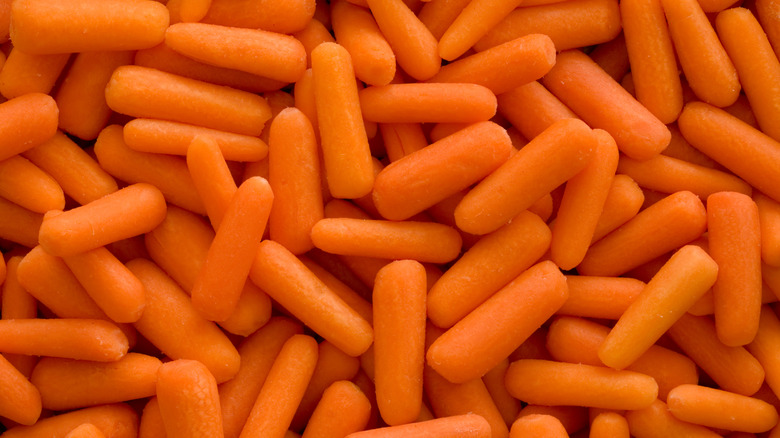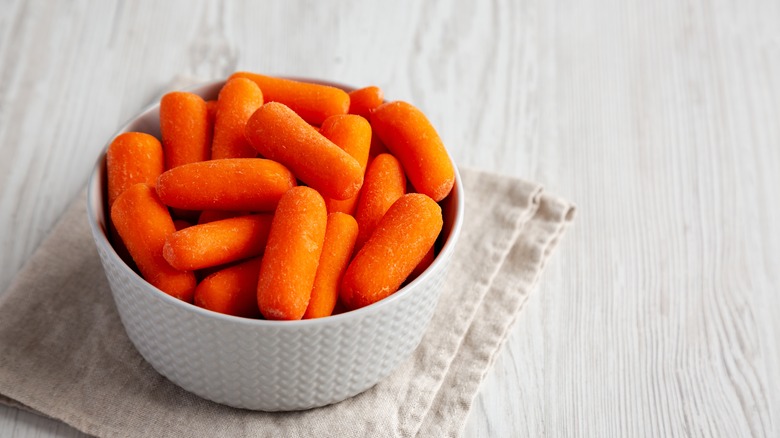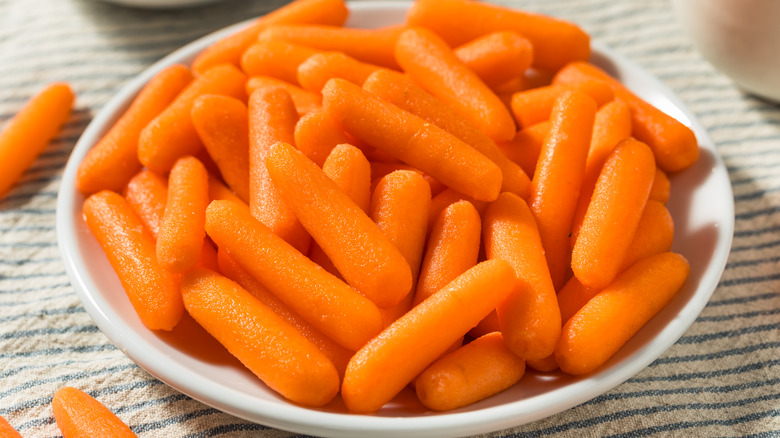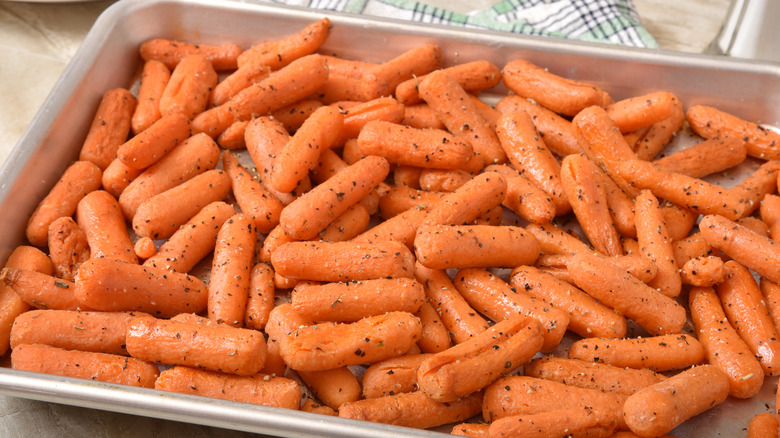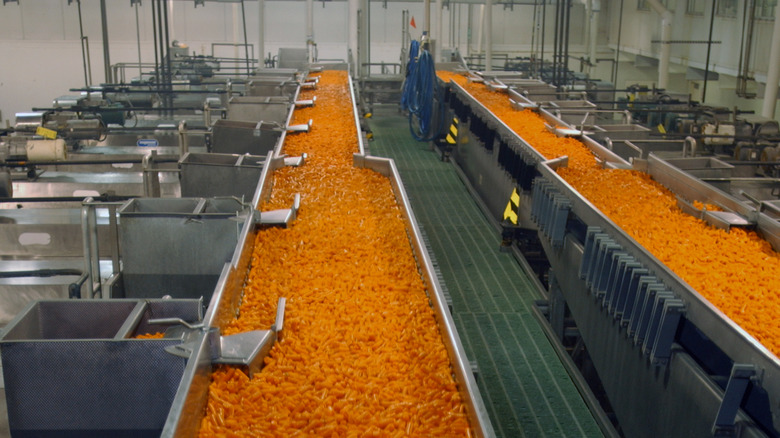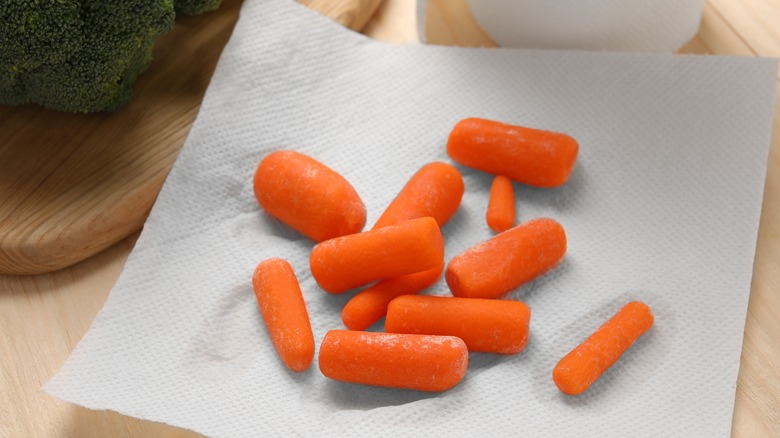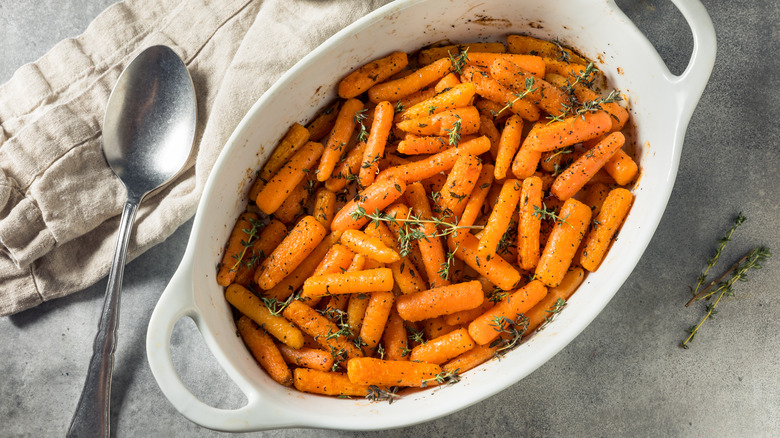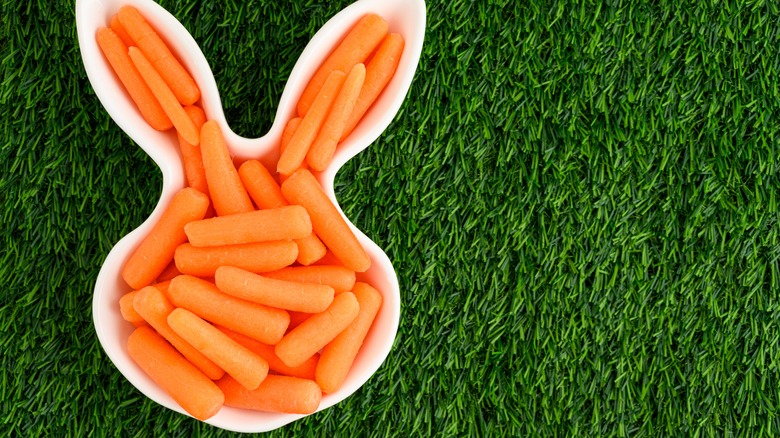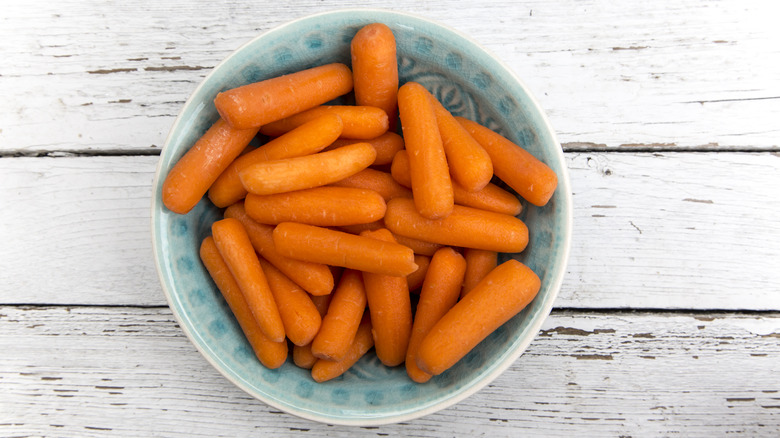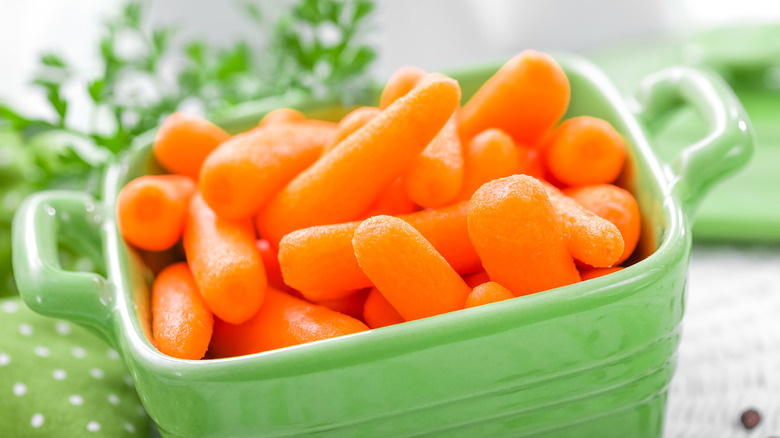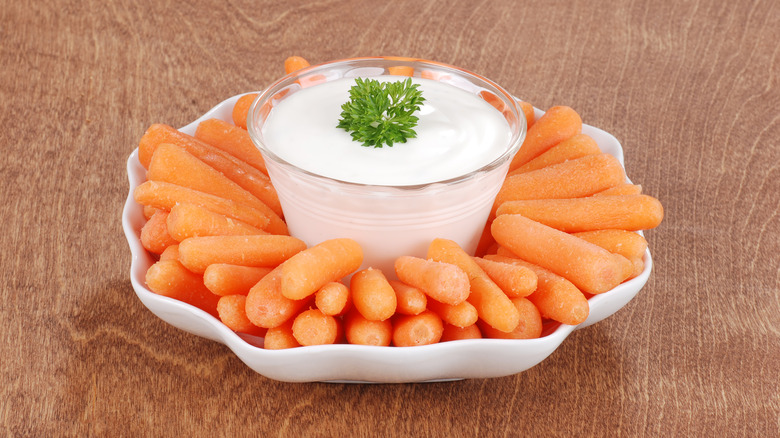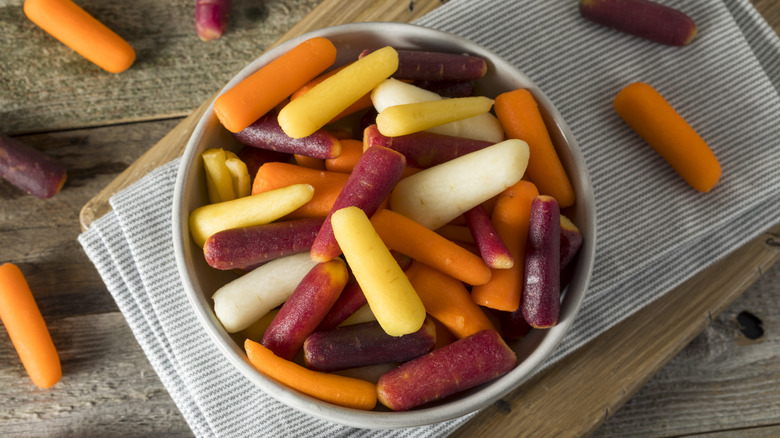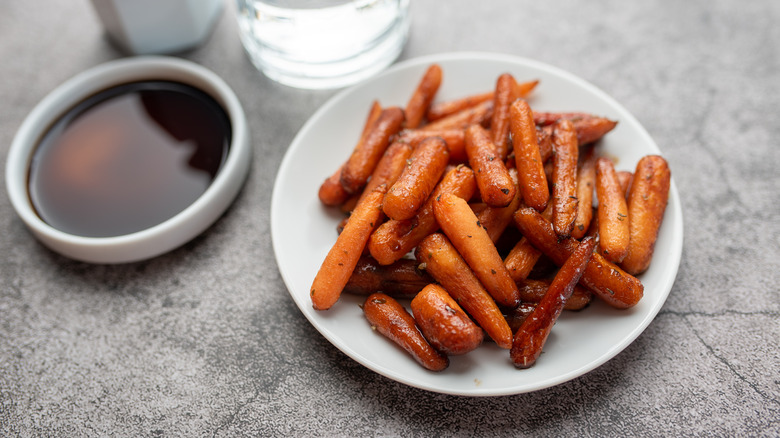Should You Be Buying Baby Carrots?
America has a love-hate relationship with baby carrots. Google them and you'll discover pages of rants about how fake and unnatural they are, down to their suspiciously uniform shape and size. But go to the produce section of any grocery store and you'll see hundreds of bags of them. And good luck going to any potluck or kids' snack table without seeing a plateful of baby carrots. Suspect as some think they are, it seems the rest of us can't get enough of them.
So why should an unassuming common vegetable engender any controversy at all? For one, the name itself is a lie: Those cute little carrots are actually pieces cut from mature carrots. They were first developed in the 1980s as a way to make use of old, misshapen carrots that would otherwise be unappealing to consumers. The gambit worked, and by 2019, baby carrots accounted for over half the carrot sales in the U.S. So is it a good idea to eat them? Below, we'll share some of their pros and cons and let you decide for yourself.
Con: They're not really babies
When we think of baby vegetables, we think of veggies that are not only small, but also tender, sweet, and fresh. Think of going to a good farmers' market in the spring and finding tiny, thin-skinned new potatoes for an elegant side dish or delicate, finger-length squash. But if you buy a bag of baby carrots expecting a similar culinary experience, you're in for disappointment. An interesting piece of carrot trivia is that so-called baby carrots are actually pared-down pieces of larger carrots, so you won't get any of that special freshness you may associate with very young vegetables. And because they're often made from big, very mature carrots, they may actually be older than the full-sized whole carrots in your market. This means you may end up with a bag of cute little carrots that taste like old carrots — tough and bitter.
In response to grumbling by consumer advocates, some producers have relabeled their mini-carrots as baby-cut carrots. This is a good move towards transparency and a healthy reminder that if you crave actual baby carrots, you're going to have to find a good farmers' market — or grow them yourself.
Con: They're wasteful
Another feature of baby carrots that makes produce purists squeamish is the amount of processing they undergo. First, the carrots are sorted: Any that are too crooked to be machined into baby carrot shapes are set aside to be grated, juiced, or used as animal feed. Next, they are passed through mechanical cutters that peel them and trim them into 2-inch segments before carving them into little cylinders. Finally, they are cleaned with a food-safe sterilizing solution before being packaged. Because of the popularity of baby carrots, some manufacturers have even bred varieties of carrots that grow to the optimal shape and size for processing.
For those whose idea of a perfect carrot is one pulled straight from the ground and simply rinsed before serving, all of this may seem like a huge waste of time and resources, especially given how mediocre the end results may taste. After all, do we really need whole factories to free us from the quick task of peeling and cutting a carrot?
Con: They're rinsed in chlorine
It's no secret that pre-cut fruit and vegetables get cleaned during processing. This isn't a bad thing. If you regularly pour salad greens straight from the bag into your salad bowl, pre-cleaning is something to be grateful for. But for some, the most common cleaning method used with baby carrots is seriously problematic: a thorough bath in a chlorine solution. While chlorine keeps foodborne pathogens such as E. coli at bay, it can also be toxic to humans. And, as anyone who's ever swallowed a mouthful of pool water knows, it doesn't smell or taste very appetizing.
It's worth noting, however, that the cleaning process only uses a small concentration of chlorine approved as safe by the FDA — and producers rinse off the chlorinated water before the baby carrots are packaged for sale. If the idea of carrots cleaned in chlorine still strikes you as unsafe or unappetizing, seek out organic baby carrots, which are typically cleaned with Citrox, a food-safe, citrus-based sanitizer.
Con: They may be less nutritious than regular carrots
A big reason for the popularity of baby carrots is that they make it easy for busy people to profit from all the health benefits of carrots without any messy cutting or peeling. Finally, we can enjoy a low-calorie, vitamin-packed, bite-sized snack with the same ease as ripping open a bag of chips. And the fact that baby carrots are durable little things that can be enjoyed at room temperature makes them a handy and healthy snacking option for road trips.
But while baby carrots are clearly more nutritious than a bag of chips, some may offer less nutritional value than regular, full-size carrots, especially wild or traditional varieties. This is because many of today's commercial carrots, including those used for baby carrots, are bred for cosmetic features and a long shelf life rather than for taste and nutrition. "When you look at wild carrots, they have high levels of thymol, a phytochemical that is essential for the body to control bacteria and ward off viral infections," Dr. Aruna Weerasooriya, a professor of agricultural sciences at Prairie View A&M University, told Fox News. "Now, when you look at some of these new carrot breeds, this type of phytochemical just isn't there."
Con: They get that ugly white film on their outsides
You may have noticed that something wonky happens to baby carrots after you open the bag and keep them around a few days: They get this ugly white film on their outsides. This may not stop you from eating them (and it shouldn't, they're still as safe as ever), but it can be a turnoff, especially if you plan to serve them to guests. It's a puzzling problem, especially since regular carrots don't seem to do this as frequently. So what's going on?
While the white layer is unappetizing, it's not as sinister as you may fear. Contrary to the rumor you may have heard, it's not residue of chlorine from its sanitizing wash — it's simply a sign that the carrots are starting to dry out. Baby carrots, which are pre-peeled, are more vulnerable to this effect than whole carrots, whose peel protects them. If you peel and cut up a whole carrot, then leave it in an open container, it will also develop a white film in a few days. So, if you hate that white film, choose whole carrots, which have built-in protection from whitening.
Con: They don't taste as good as regular carrots
We can't deny that baby carrots are cute. With their uniform shape and size and gentle curves, it's easy to imagine how elegant they'd look in a dressy cooked dish, such as Anthony Bourdain's decadent glazed carrots Vichy. With luck, your diners will be so charmed they won't notice you used baby carrots and instead marvel at how you managed to carve them all so smoothly and consistently.
Unfortunately, the fancy-restaurant energy may dissipate the moment your guests take a bite. High-end chefs seek out the freshest produce, often procured directly from the growers, to ensure every dish tastes its best. But if you use baby carrots, you're not getting ultra-fresh produce, even if you buy them the day you serve them. Baby carrots are often made from older carrots, which are tougher and less sweet than younger ones. So, if you're aiming for exceptional flavor, skip the baby carrots.
Con: They're pricier than regular carrots
Baby carrots have become a staple in many households because they're so easy to serve — no cutting, washing, or cooking needed. Plopped from the bag onto a plate with a bowl of two-ingredient dip, they make a company-worthy appetizer with just seconds of work. All this convenience, however, comes at a price — literally. Because of all the labor and machinery needed to shape, clean, and package them, they're significantly more expensive than whole carrots.
As an example, while a 2-pound bag of whole organic carrots goes for $2.14 (or ($1.07/pound) at Walmart, a 1-pound bag of organic baby carrots will set you back $1.66. This might not seem like a lot (an advantage of carrots, in general, is that they're cheap), but if you buy a bag or two of baby carrots a week, the costs can add up, especially if you're trying to keep to a budget. And given that whole carrots are not only cheaper but last longer and taste better than babies, it may be well worth your while to save the money and dedicate a few minutes of your time each week to washing and trimming whole carrots.
Pro: They're convenient
For all their flaws, baby carrots remain wildly popular for one simple reason: They're super convenient. Under any online thought piece about the environmental, nutritional, or gustatory horrors of baby carrots, you're certain to find dozens of dissenting comments from defenders who are happy to let purists know they can take their baby carrots from their cold, dead hands.
Yes, it takes just seconds for an able-bodied, experienced cook to trim, peel, and cut a whole carrot into sticks. But as some baby carrot apologists have pointed out, not everyone is blessed with coordination and skill. For seniors and people with disabilities, pre-trimmed fruits and vegetables such as baby carrots are a godsend that makes it possible for them to enjoy fresh vegetables at home. And we can think of other contexts where they'd be handy too, such as if you're trying to cook in an Airbnb stocked with dull knives (is there any other kind?). And for students and others with limited cooking knowledge or equipment, they're a better choice than no vegetables at all.
Pro: They're imperfect, but still a healthy snack
Let's admit it: There's something distinctly fake about baby carrots. Fans of garden-fresh carrots will happily tell you that baby carrots not only look like plastic toys, but they taste and smell like them, too. And snooty as these critics may sound, they have a point. Baby carrots are often made from vegetables that are past their prime, so they lack the sweetness and tenderness of whole fresh carrots. They also undergo a lot of processing to become bite-sized babies, from peeling to carving to sanitizing and packaging, so they can lose a lot of their natural flavor in the process.
But you know what else is loaded with artificial ingredients and undergoes tons of processing? Most other packaged, bite-sized snack foods out there. Flawed as they are, baby carrots are clearly a more nutritious snack choice than chips or other junk foods. They're not only naturally low in calories and cholesterol-free, but they're a great source of vitamin A and beta carotene, which promote healthy eyesight and immune resilience. A 100-gram portion of Cheetos, in contrast, contains 565 calories and no vitamins.
Pro: Kids will actually eat them
It's a problem as old as time: getting kids to eat their fruits and vegetables. It's not just a matter of etiquette, either. Kids need the all-important nutrients offered by fruits and veggies for healthy development, and the bigger the kid, the more veggies they need. But because many children shy away from strong, bitter flavors, they tend to dislike leafy greens appreciated by adults, such as spinach and kale. Some kids are also naturally fearful of any unfamiliar food. This evolutionary trait may have prevented our ancestors from accidentally poisoning themselves as children, but it makes it harder for modern kids to get enough nutrients.
Carrots, however, have always been an effective gateway veggie for small children. Their sweetness and pretty orange color make them an easy sell to picky eaters, and their wealth of nutrients is yet another plus. And when baby carrots first appeared in the 1980s, kids eagerly embraced them. Children love things that are right-sized for them, and the cute little carrots soon started to make regular appearances in school lunches. They soon earned a reputation as a rare good-for-you food that kids eat by choice — so what's not to like?
Pro: They keep edible-but-ugly carrots out of landfills
Among the many complaints of baby carrot haters is that these so-called babies are cut from substandard carrots that no one would willingly buy or eat in their original form. But viewed from a different angle, this could be seen as a plus: Upcycling wonky carrots into baby carrots is an effective way to combat food waste.
And food waste is a huge problem in the U.S. — about 92 billion pounds of food is wasted in the States each year, amounting to about $473 billion or 38% of all food in the country. Among the reasons perfectly edible produce is discarded is because it looks unattractive — for instance, it's oddly shaped or the wrong size. Consumers have grown more aware of the problem and more open to eating oddball produce, as seen by the success of startups such as Misfit Foods, which incorporates ugly-duckling vegetables into its line of sausages, and Misfits Market, which sells such produce directly to consumers. Ironically, those too-perfect-looking baby carrots from your childhood lunchbox can be seen as an early precursor to these waste-reduction efforts.
Not all baby carrots are that bad
According to some critics, baby carrots are bite-sized examples of everything that's wrong with our industrial food system. Made from old, woody carrots and soaked in chemical sanitizers, they waste resources, are needlessly pricy, and taste soapy and gross. On top of all that, they may not even be as nutritious as regular carrots.
But if you like the convenience of baby carrots but worry about their safety, have no fear: Not all baby carrots are created equal, and you can find babies that will give you at least some peace of mind. A good place to start is to seek out organic baby carrots, which are sanitized with a citrus-based solution rather than chlorine. In addition, not all baby carrots are still made from old rejects. Because of their popularity, some producers have bred their own varieties specifically to be cut into baby carrots. These varieties have been bred not only to grow to the optimal size for processing but for extra sweetness. They may not offer the same flavor experience as a fresh farmer's market carrot, but they're still an improvement over standard baby carrots.

